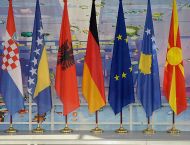
EU and the Western Balkans
Legal basis
- Title V of the Treaty on European Union (TEU): EU external action;
- Article 207 of the Treaty on the Functioning of the European Union (TFEU): international trade agreements;
- Article 49 TEU: criteria for application and membership.
Objectives
The EU aims to promote peace, stability and economic development in the Western Balkans and open up the prospect of EU integration.
Background
In 1999, the EU launched the Stabilisation and Association Process (SAP), a framework for relations between the EU and countries in the region, and the Stability Pact, a broader initiative involving all key international players. The Stability Pact was replaced by the Regional Cooperation Council in 2008. The 2003 European Council in Thessaloniki reaffirmed that all SAP countries were potential candidates for EU membership. This ‘European perspective’ was reaffirmed in the Commission’s February 2018 Western Balkans Strategy and in the Sofia Declaration following the EU-Western Balkans Summit of 17 May 2018 in the Bulgarian capital.
Instruments
- A. The Stabilisation and Association Process (SAP)
Launched in 1999, the SAP is the strategic framework supporting the gradual rapprochement of the Western Balkan countries with the EU. It is based on bilateral contractual relations, financial assistance, political dialogue, trade relations and regional cooperation.
Contractual relations take the form of stabilisation and association agreements (SAAs). These provide for political and economic cooperation and for the establishment of free trade areas with the countries concerned. Based on common democratic principles, human rights and the rule of law, each SAA establishes permanent cooperation structures. The Stabilisation and Association Council, which meets annually at ministerial level, oversees the application and implementation of the agreement concerned. It is assisted by the Stabilisation and Association Committee. Finally, a Stabilisation and Association Parliamentary Committee (SAPC) ensures cooperation between the Western Balkan countries’ parliaments and the European Parliament.
Since the entry into force of the SAA with Kosovo in April 2016, SAAs are now in force with all Western Balkan candidate and potential candidate countries. In the case of Kosovo, the SAA is an EU-only agreement, which Member States do not need to ratify (five Member States do not recognise Kosovo as an independent state). Trade and trade-related aspects of SAAs are included in interim agreements. They generally enter into force swiftly after they have been signed, as trade is an exclusive EU competence.
- B. The accession process
Applicants for EU membership must fulfil the Copenhagen political criteria (see fact sheet on ‘Enlargement of the Union’). Once a country has been recognised as a candidate, it moves through the various stages of the process at a rate largely dependent on its own merits and progress.
A candidate country must adopt and implement all EU legislation (the acquis communautaire). The Commission reports on progress in its annual country reports. Every important decision is taken by the Council, acting by unanimity, from the opening of negotiations to their closure. The accession treaty has to be endorsed by Parliament and the Council before being ratified by all contracting states.
Candidate and potential candidate countries receive financial assistance to carry out the necessary reforms. Since 2007, EU pre-accession assistance has been channelled through a single, unified instrument: the Instrument for Pre-accession Assistance (IPA).
Most candidate and potential candidate countries may also participate in EU programmes.
- C. Regional cooperation
European integration and regional cooperation are closely intertwined. One of the key aims of the SAP is to encourage countries of the region to cooperate among themselves across a wide range of areas, including the prosecution of war crimes, border issues, refugees and the fight against organised crime. A specific component of the IPA is dedicated to regional cooperation and cross-border programmes.
The Sarajevo-based Regional Cooperation Council (RCC) operates under the guidance of the South-East European Cooperation Process (SEECP). The RCC aims to support the European and Euro-Atlantic aspirations of its non-EU members, and to develop cooperation in such fields as economic and social development, energy and infrastructure, justice and home affairs, security cooperation, building human capital, and parliamentary relations. The EU and many individual Member States support and participate in the RCC.
Another important regional initiative is the Central European Free Trade Agreement (CEFTA). In addition, countries of the Western Balkans participate in a number of regional frameworks.
- D. Visa-free travel
Visa-free travel to the Schengen area was granted to citizens of the former Yugoslav Republic of Macedonia (now the Republic of North Macedonia), Montenegro and Serbia as of December 2009, and to citizens of Albania and Bosnia and Herzegovina as of November 2010. In January 2012, a visa liberalisation dialogue was launched with Kosovo. In July 2018, the Commission confirmed that Kosovo had fulfilled the last criterion. Parliament followed suit and decided to enter into interinstitutional negotiations, which are ongoing.

RECENT STEPS ON EU INTEGRATION OF WESTERN BALKANS
Bulgarian Presidency of the Council of the EU /January – June 2018/
European Perspective and Connectivity of the Western Balkans
When talking about united Europe, we should not forget that the Western Balkans need a clear European perspective and connectivity between them and with the member states. The ambition of the Bulgarian Presidency is to achieve a clear action plan with each of the countries, without creating unrealistic expectations, but with concrete steps. This is the way to have long lasting peace, security and prosperity in the region. The goal is to provide connectivity to the Western Balkan countries – transport, air, energy, educational and digital. Bulgaria invests consequent efforts in this direction, for example by promoting the digital policies of the EU among the countries in the Western Balkans through gradual reduction of roaming charges and by increasing the possibilities for broadband internet access.

Commission adopts a credible enlargement perspective for the Western Balkans countries
As President Juncker announced in his 2017 State of the Union address, the Commission adopted recently a strategy for 'A credible enlargement perspective for and enhanced EU engagement with the Western Balkans', confirming the European future of the region as a geostrategic investment in a stable, strong and united Europe based on common values.
The Strategy clearly spells out that the EU door is open to further accessions when – and only when – the individual countries have met the criteria.
The strategy also spells out the priorities and areas of joint reinforced cooperation, addressing the specific challenges the Western Balkans face, in particular the need for fundamental reforms and good neighbourly relations. A credible enlargement perspective requires sustained efforts and irreversible reforms. Progress along the European path is an objective and merit-based process which depends on the concrete results achieved by each individual country.
The Strategy sets out an Action Plan with six concrete flagship initiatives targeting specific areas of common interest: rule of law, security and migration, socio-economic development, transport and energy connectivity, digital agenda, reconciliation and good neighbourly relations. Concrete actions in these areas are has been realized between 2018 and 2020.
All Western Balkans have the chance to move forward on their respective European paths. The Commission assesses all the countries in a fair and objective manner on the basis of their own merits and at the speed at which they achieve progress. The Commission will start preparing an Opinion on Bosnia and Herzegovina's membership application following receipt of comprehensive and complete answers to its Questionnaire. With sustained effort and engagement, Bosnia and Herzegovina could become a candidate for accession.

Engagement with the Western Balkans will be a priority for the rest of the mandate was stated by Commission President Ursula von der Leyen at 06 of March 2020 during the “A Union that strives for more: the first 100 days” speech.
Based on those policy lines and also on the sustainable cooperation we have created during the last few years with the partner organization in Bosnia and Herzegovina, the consortium has decided to include the partner in the consortium and through the project activities to promote both the priority of the Bulgarian presidency of the Council of the EU and the policy line that the European commission has set for the future of the EU. The added value that the partner brings to the consortium can be considered high as it is in line with the implementation of the EU policy in the field together with the huge impact that project activities will have on local level. On the same time, partners expertise and know-how will be important to the overall delivery of the project as this way will be analyzed also the needs of the citizens and experts in the EU partner countries and they will be much more prepared for their future joining the European union family.
Testimonials








 Project "Sport Diplomacy Academy" /2018-1-EACS-EMS-000114/ is co-funded by the European Union. This webpage and the information / publication / communication reflects the views only of the author, and the
Commission cannot be held responsible for any use which may be made of the information contained therein.
Project "Sport Diplomacy Academy" /2018-1-EACS-EMS-000114/ is co-funded by the European Union. This webpage and the information / publication / communication reflects the views only of the author, and the
Commission cannot be held responsible for any use which may be made of the information contained therein.


